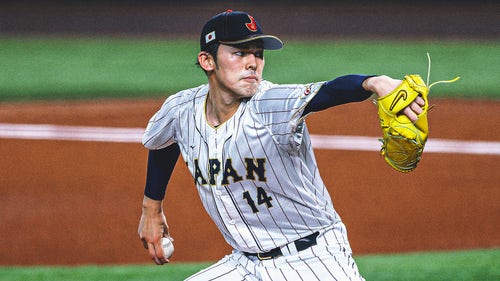
Harvey to try rehab over surgery
Matt Harvey will try to rehab his injured right elbow without reconstructive surgery, a move the young ace hopes is going to keep him on the mound for the New York Mets next season.
Tommy John surgery remains a possibility. Harvey will soon begin a throwing program designed to last as long as six to eight weeks. If he feels pain or other symptoms that hinder his pitching, he likely will need the operation — which probably would sideline him for 2014.
"There's always a risk to having surgery. There's obviously going to be a risk not to have surgery. It's not a 100 percent procedure, although it's definitely getting a lot better," Harvey said. "I believe if I can rehab, I'd rather bet on myself doing the work to stay out of getting surgery than having the surgery."
The decision was announced Tuesday night at Citi Field, one day after Harvey was examined by Dr. James Andrews in Florida to get a second opinion on his right elbow. The 24-year-old was diagnosed with a partially torn ulnar collateral ligament by Mets doctors on Aug. 26.
Harvey said Andrews tested his elbow and told him he believed it was "very stable."
"I've never had pain in my actual elbow area where the UCL is," Harvey said. "And just for me it felt like, why jump into surgery in a situation where I never had the tingling, the numbness, the shooting pain in my elbow that are usually the symptoms of needing that surgery? For me, if a rehab process of strengthening is the way to go, in my mind that's what I wanted to do."
At a long-awaited news conference only minutes before the Mets played the San Francisco Giants, general manager Sandy Alderson said if Harvey eventually needs Tommy John surgery, trying the throwing program first should not prevent the right-hander from returning for the 2015 season.
"We may know nothing at the end of this period of time, or we may know something early in the process," Alderson said.
Stunned by the news last month, Harvey said he would do everything he could to avoid surgery. He spoke with other pitchers who had similar injuries and didn't require the operation, including Philadelphia right-hander Roy Halladay.
Harvey was so encouraged that a day after his diagnosis, he tweeted that he would be back on the mound next April. Still, the Mets maintained that no decision would be made for a few weeks, until the swelling subsided and Harvey was re-examined.
In the meantime, he was shut down for the rest of the season.
"The last three weeks have been pretty tough," Harvey said. "Obviously, I want to be on the field and I want to be pitching, and (being) kind of in that area of not knowing what's going on is tough. It's a tough process. But everything feels completely normal."
Tommy John surgery has become a common procedure for pitchers, with a great many making successful comebacks after their damaged ligaments were replaced. The recovery and rehabilitation, however, usually takes at least a year.
"I'm still very optimistic," Harvey said. "But I know if there is a red flag during that (throwing program) that something needs to be done."
Harvey started the All-Star game for the National League on his home field in July. He is 9-5 with a 2.27 ERA and 191 strikeouts in 178 1/3 innings.
The seventh pick in the 2010 amateur draft, Harvey blossomed into one of baseball's most dominant pitchers this year — his first full season in the majors. His 98 mph fastball and polished off-speed pitches gave hope to a foundering franchise that is finishing up its fifth straight losing season since moving into Citi Field.
Harvey and Zack Wheeler were the first to arrive from a crop of touted young pitchers the Mets have pinned their future on. New York captain David Wright cited all the hard-throwing talent in the minors as one reason he signed a $138 million, eight-year contract last winter to stay with the team.
With more than $40 million in player salaries coming off the payroll after this season, the Mets expect to be active in free agency. They have long fancied themselves a 2014 contender, but Harvey is certainly a lynchpin.
"I think there's some ambiguity of course at this point, and maybe through the next couple of months. There may be ambiguity beyond that," Alderson said. "I don't think it's going to affect our offseason planning as much as has been speculated. One thing we have is a great deal of starting pitching depth — some of it untested at the minor league level. But we have a lot of confidence in the quality and quantity of our starting pitching. So hopefully Matt is part of that rotation next year, but if he's not, I don't foresee us working hard to fill his spot from outside the organization."










